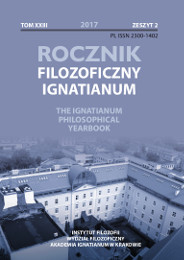Myślenie bez języka — problem w ujęciu Thomasa Hobbesa i Olivera Sacksa
Thought without language: the problem as construed by Thomas Hobbes and Oliver Sacks
Author(s): Katarzyna DoliwaSubject(s): History of Philosophy
Published by: Uniwersytet Ignatianum w Krakowie
Keywords: T. Hobbes; O. Sacks; język; myślenie
Summary/Abstract: Thomas Hobbes studied many issues pertaining to language, one of which was the following: is it possible to think at all, and to think abstractly, without language? He assumed that people deprived of language would be able to create their own private languages that would allow them to engage in something understood by them, in their terms, as reasoning. Three hundred years later, Hobbes’s question received an answer from the prominent neurologist and writer Oliver Sacks. Based on his experiences of working with deaf people who do not know any language (including sign languages), Sacks argues that words and other conventional signs are only needed at a certain stage of the thought process. He proves that the scope of thought is much broader than that of words, and that one can, in a certain sense, think without the latter. However, Sacks emphasizes, as Hobbes previously had, that thinking which does not use universally accepted signs is imperfect and incomplete. Such thinking will not be expressed, and so isolates the individual in relation to life in society.
Journal: Rocznik Filozoficzny Ignatianum
- Issue Year: 23/2017
- Issue No: 2
- Page Range: 61-84
- Page Count: 24
- Language: Polish

